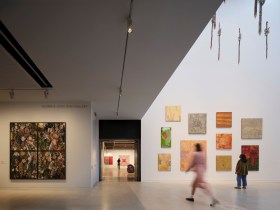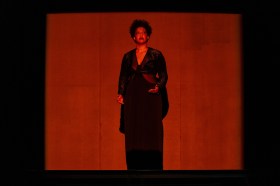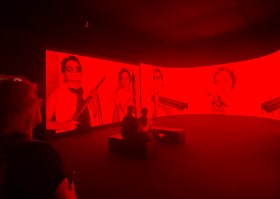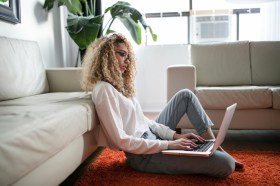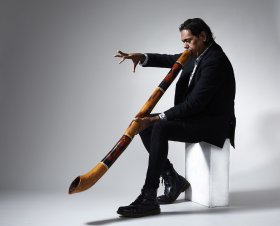UK artist Rachel Gadsden will deliver a stirring keynote address at Arts Activated in August. Picture: Supplied
British visual artist Rachel Gadsden has built an impressive career over the past 25 years. She was the first contemporary artist appointed to Hampton Court Palace, has undertaken four major commissions for the UK Parliament, and has completed major commissions for the four most recent Paralympic Games and just unveiled a major work in Paris for the 2019 Women’s World Cup.
She also identifies as an artist living with a disability. She has some vision impairment but was also born with a debilitating lung condition which requires her to wear a syringe driver that injects her with medication every minute to keep her alive.
Gadsden is now a disability arts activist, using her work, multiple cross-cultural collaborations as well as her reputation to try to forge a clearer way forward for emerging artists who also identify – but stigma and prejudice within the arts sector meant she wasn’t always so brazen.
‘I completely hid for about the first five to 10 years of my artistic career,’ she told ArtsHub. ‘You can’t see my disability. I hid because I never would have got any of the commissions I was going for because at the time people just didn’t want to take on board disabled people.’
It was only up until a few years ago that people stopped asking if her current work was for a ‘disabled’ or ‘mainstream’ project.
‘It used to drive me insane because it was very belittling,’ she said. ‘It was as though if it was a ‘disabled’ project then it would be the lesser of my work, which is not how I felt about it.
‘I am a disabled person so this is my voice, it is what I am talking about. It’s one of the layers of my work.’
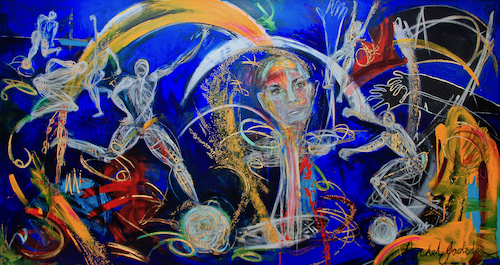
Gadsden’s work for FIFA, True Passion, centres on US soccer champion Mia Hamm who was born with a partial clubfoot. Picture: Supplied
She is the keynote speaker at the Arts Activated 2019 conference, a leading forum for arts and disability to be held in Sydney in August. The biennial event, hosted by peak NSW arts and disability body Accessible Arts, attracts up to 300 artists, arts workers, disability advocates and researchers and hosts more than 20 sessions designed to educate and empower artists and ignite important conversations.
Gadsden plans to impart her personal experience to attendees to help others enact real change within the Australian arts sector.
‘There will be a lot of disabled artists in the audience so obviously the focus is how can I empower them to get them to think as big as possible and to use some of the projects I have done as examples of how change can happen,’ she said.
‘That will also be bringing an insight for the mainstream organisations to say ‘I was commissioned to do this project and this was what was needed to be in place for that to happen’.
Gadsen says the responsibility for creating change is twofold — artists need to step up and be more visible and forthright, and mainstream arts organisations need to think through a different lens. She says the best audience for the Arts Activated conference would be those with the power to create real and lasting change for artists and audiences with a disability.
‘Mainstream galleries, for instance, have an absolutely massive issue about showing work by an artist with a disability, they tend to think it would be second-rate work,’ she said.
‘Ultimately it would be wonderful to come to the conference and it would be full of mainstream practitioners, mainstream organisations – you don’t need to talk to disabled organisations and practitioners because we know what needs to happen. So it’s the mainstream organisations and the gallery directors will come to the conference and see what is necessary for them – it is slight shifts.’
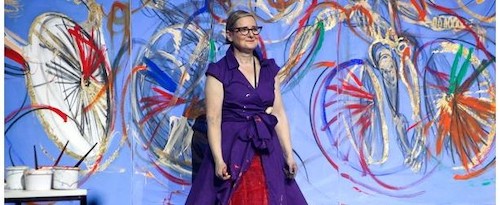
The Arts Activated 2019 conference will feature workshops and presentations by a variety of practitioners. Picture: Supplied
Gadsden’s experience in the UK mirrors that of many Australian artists, said Kerry Comerford CEO at Accessible Arts. When she took on the role, she quickly became aware of the inequity facing artists with a disability.
‘I think the world of the arts thinks it is really inclusive, but once you start working in this sector you suddenly become aware that it is not as inclusive as we all like to think it is,’ she said.
‘I think there are general inclusion challenges but they become tenfold when you start to look at the area of disability and access. So what is the access for people? How do artists with a disability have the opportunity to participate as audience members and artists?’
Comerford agrees with Gadsden that the crux of the issue lies with the decision-maker – the artistic directors, gallery curators, government officials and in boardrooms of major arts organisations.
‘I think the biggest challenge is ignorance,’ she told ArtsHub. ‘There are assumptions made about people’s abilities without people actually really having engaged in a conversation with a lot of people or really observed the work they are doing.’
‘The idea of the conference is to draw people’s attention to it.’
The theme of the conference is Making it Happen Today, and Comerford says it may sound ambitious, but the time really is now to reshape policies to ensure inclusivity and equity for artists, arts workers and audiences with a disability.
‘That theme came about from people saying we keep talking about this, but when are we going to see significant change?’ she said. ‘It’s really about what the artists and the arts workers see as a real win.’
‘I would love to see some of the leading arts organisations really making a commitment to serious change. It’s about setting real goals – having a target by 2030 we will have increased participation by a certain percentage or something like that.’
Comerford says the main goal is to provide a warm and inclusive environment for a free-flowing exchange of ideas.
‘Attendees will include a mixture of those who identify and those who do not, so artists with disability; access and inclusion arts workers across the major cultural institutions; local council members working in the access and inclusion area,’ she said, ‘I encourage everyone to come along and be part of the conversation.’
For more information about Arts Activated and to register, visit www.artsactivated2019.com.


